Unit 1: Nature of Contracts - 1 Chapter Notes | Business Laws for CA Foundation PDF Download
| Table of contents |

|
| Overview |

|
| What is a Contract? |

|
| Essentials of a Valid Contract |

|
| Types of Contracts |

|
| Proposal / Offer [Section 2(a) of the Indian Contract Act, 1872] |

|
Overview
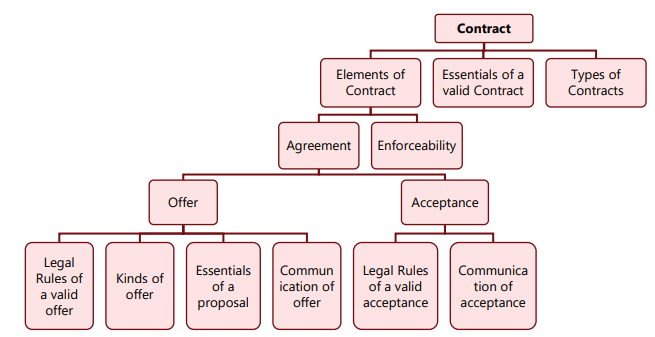
Contract Law before Indian Contract Act, 1872
To understand the evolution of Contract Law prior to the Indian Contract Act of 1872, it is essential to trace the development of contract law across various historical periods.
- In ancient and medieval times, there was no dedicated legislation for contracts.
- Instead, different sources of Hindu law, such as the Vedas, Dharmashastras, Smritis, and Shrutis, provided detailed descriptions of laws akin to contracts during those eras.
- Under the Mauryan period, contracts took the form of "bilateral transactions" based on the free consent of all parties involved regarding the terms and conditions.
During the Mughal era in India, contracts were governed by the Mohammedan Law of Contract.
- In this context, the Arabic term Aqd referred to a contract, meaning a conjunction.
- Similarly, Ijab denoted a proposal, and Qabul indicated acceptance.
- The formation of a contract under Islamic law required no formalities; the only necessity was the explicit consent of both parties regarding the same matter in the same sense.
Hindu law differs fundamentally from English law.
- Hindu law is a compilation of various customs and the interpretations of Smritikaras, who analyzed the Vedas to develop different aspects of Hindu law.
- Under Hindu law, individuals who are minors, intoxicated, elderly, or handicapped cannot enter into valid contracts.
- According to Narada Smriti, a person up to 8 years old is considered an infant, ages 8 to 16 are classified as boyhood, and individuals over 16 years are deemed competent to enter into contracts.
During the British period, before the Indian Contract Act was enacted, English law was applied in the presidency towns of Madras, Bombay, and Calcutta, following the Charter of 1726 issued by King George to the East India Company.
- If one party in a contract belonged to one religion and the other party belonged to a different religion, the law of the defendant would apply.
- This practice was followed in the presidency towns, while in areas outside these towns, disputes were resolved based on justice, equity, and good conscience.
- This procedure remained in place until the implementation of the Indian Contract Act in India.
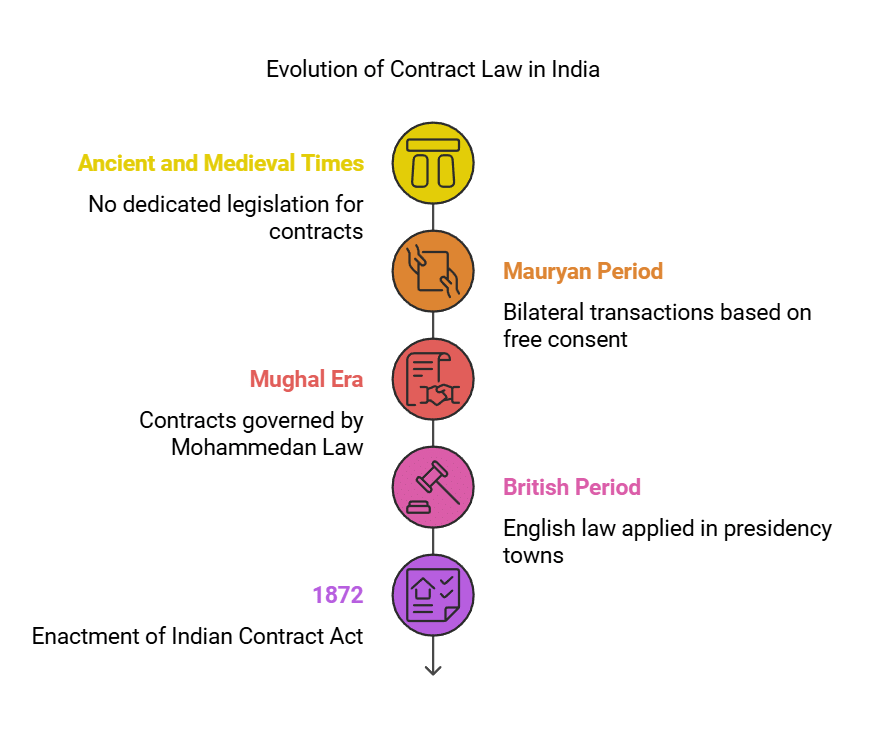
The Law of Contract: Introduction
- The Law of Contract is a crucial aspect of mercantile or commercial law, impacting everyone, particularly in trade, commerce, and industry.
- It can be said that contracts form the foundation of a civilized society.
- The legal framework for contracts is governed by the Indian Contract Act, 1872, which was enacted on April 25, 1872, and became effective on September 01, 1872.
- The preamble of the Act states that it aims "to define and amend certain parts of the law relating to contract."
- This Act applies throughout India, including Jammu and Kashmir following the abrogation of Article 370 of the Indian Constitution.
- The Act primarily addresses the general principles and rules that govern contracts and is divided into two parts.
- The first part (Sections 1-75) covers the general principles applicable to all contracts, regardless of their nature.
- The second part (Sections 124-238) focuses on specific types of contracts, such as indemnity and guarantee, bailment, pledge, and agency.
- Due to the increasing complexities of the business environment, numerous contracts are formed by parties during their business activities.
- A 'contract' is the most common way to establish rights and responsibilities in a business transaction.
- This area of law is distinct from other legal branches as it does not impose numerous rights and duties that the law will uphold; instead, it provides limiting principles under which parties can create their own rights and obligations.
- The Indian Contract Act, of 1872 codifies the legal principles governing contracts, identifying the essential elements for a legally enforceable valid contract.
- It also addresses certain special contractual relationships such as indemnity, guarantee, bailment, pledges, quasi-contracts, and contingent contracts.
- It essentially outlines the conditions under which promises made in a contract will be legally binding.
What is a Contract?
The term contract is defined under section 2(h) of the Indian Contract Act, 1872 as: “an agreement enforceable by law.” A contract consists of two essential elements:- an agreement, and
- its enforceability by law.
(i) Agreement - The term ‘agreement’ mentioned in Section 2(e) of the Act is defined as: “every promise and every set of promises, forming the consideration for each other.” To understand the definition of an agreement, we need to comprehend the term promise. Section 2(b) defines promise as: “when the person to whom the proposal is made signifies his assent thereto, the proposal is said to be accepted. A proposal when accepted becomes a promise.” The following points emerge from this definition:
- when the person to whom the proposal is made
- signifies his assent to that proposal made to him
- the proposal was accepted
- accepted proposal becomes a promise
Thus, we conclude that an agreement results from a proposal made by one party to another, which the other party accepts, typically for mutual consideration.
Agreement = Offer/Proposal + Acceptance + Consideration
(ii) Enforceability by law – For an agreement to qualify as a contract, it must create a legal obligation, meaning it is duly enforceable by law. Therefore, from the definitions above, we can conclude that:
Contract = Agreement + Enforceability by law
By elaborating on these two concepts, it is clear that a contract consists of an agreement, which is a promise or a set of reciprocal promises. A promise is the acceptance of a proposal, leading to a binding contract. Furthermore, section 2(h) necessitates that an agreement must be capable of being enforceable by law to be termed a ‘contract’. When parties establish a binding contract, they create rights and obligations between themselves.
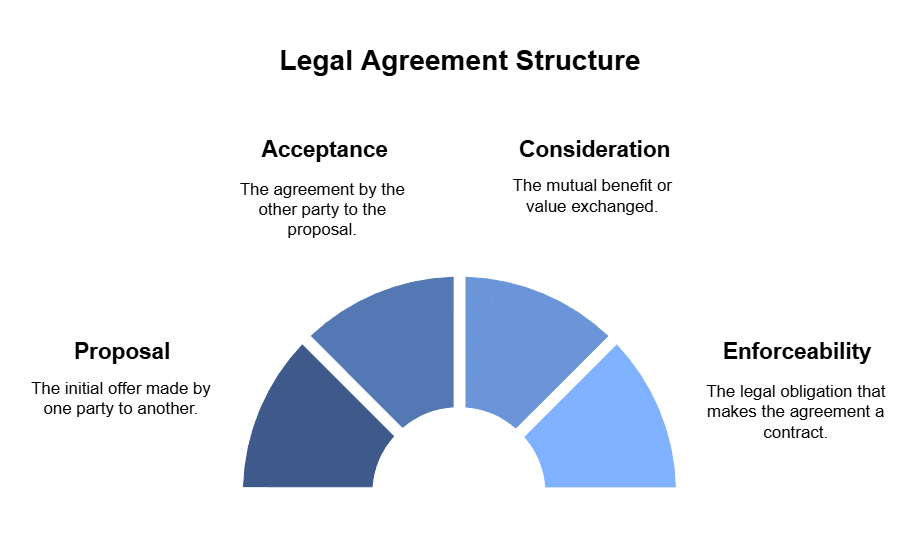
Example 1: A agrees with B to sell car for ₹ 2 lacs to B. Here A is under an obligation to give car to B and B has the right to receive the car on payment of ₹ 2 lacs and also B is under an obligation to pay ₹ 2 lacs to A and A has a right to receive ₹ 2 lacs.
Example 2: Father promises his son to pay him pocket allowance of Rs. 500 every month. But he refuses to pay later. The son cannot recover the same in court of law as this is a social agreement. This is not created with an intention to create legal relationship and hence it is not a contract.
So, Law of Contract deals with only such legal obligations which has resulted from agreements. Such obligation must be contractual in nature. However, some obligations are outside the purview of the law of contract.
Example 3: An obligation to maintain wife and children, an order of the court of law etc. These are status obligations and so out of the scope of the Contract Act.
Difference between Agreement and Contract
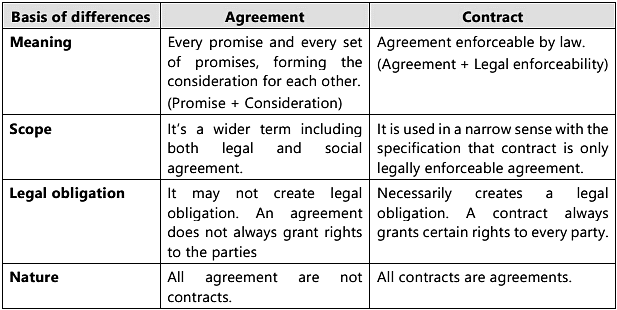
Essentials of a Valid Contract
In terms of Section 10 of the Act, “all agreements are contracts if they are made by the free consent of the parties competent to contract, for a lawful consideration and with a lawful object and are not expressly declared to be void”.
Since section 10 is not complete and exhaustive, so there are certain other sections which also contains requirements for an agreement to be enforceable. Thus, in order to create a valid contract, the following elements should be present:
- Two Parties:One cannot enter into a contract with oneself. A contract requires at least two parties: one making the offer and the other accepting it. Contracts can be formed by natural persons and entities with legal existence, such as companies and universities. It is important that the identities of the parties are identifiable.
Example 4: To create a contract of sale, two parties must be involved: the seller and the buyer. The seller and buyer must be distinct individuals, as a person cannot purchase their own goods.
In State of Gujarat vs. Ramanlal S & Co., when a partnership was dissolved and the firm's assets were allocated among the partners, the sales tax officer sought to impose tax on this transaction. It was determined that it was not a sale, as the partners, being joint owners of the assets, could not be both buyer and seller.
- Parties must intend to create legal obligations: There must be an intention on the part of the parties to create legal relationship between them. Social or domestic type of agreements are not enforceable in court of law and hence they do not result into contracts.
Example 5:A husband agreed to pay to his wife certain amount as maintenance every month while he was abroad. Husband failed to pay the promised amount. Wife sued him for the recovery of the amount. Here, in this case, wife could not recover as it was a social agreement and the parties did not intend to create any legal relations. (Balfour v. Balfour)
Example 6:Mr. Lekhpal promises to pay ₹ 5 lakhs to his son if the son passes the CA exams. On passing the exams, the son claims the money. Here, the son could not recover as it was a social agreement.
Example 7: A sold goods to B on a condition that he must pay for the amount of goods within 30 days. Here A intended to create legal relationship with B. Hence the same is contract. On failure by B for making a payment on due date, A can sue him in the court of law. - Other Formalities to be complied with in certain cases: A contract may be written or spoken. As to legal effects, there is no difference between a written contract and contract made by word of mouth. But in the interest of the parties the contract must be written. In case of certain contracts some other formalities have to be complied with to make an agreement legally enforceable.
For e.g. Contract of Insurance is not valid except as a written contract. Further, in case of certain contracts, registration of contract under the laws which is in force at the time, is essential for it to be valid, e.g. in the case of immovable property. Thus, where there is any statutory requirement that any contract is to be made in writing or in the presence of witness, or any law relating to the registration of documents must be complied with. - Certainty of meaning:The agreement must be certain and not vague or indefinite. Example 8: A agrees to sell to B a hundred tons of oil. There is nothing certain in order to show what kind of oil was intended for. Example 9: XYZ Ltd. agreed to lease the land to Mr. A for indefinite years. The contract is not valid as the period of lease is not mentioned.
- Possibility of performance of an agreement: The terms of agreement should be capable of performance. An agreement to do an act impossible in itself cannot be enforced.
Example 10: A agrees with B to discover treasure by magic. The agreement cannot be enforced as it is not possible to be performed
Now, according to Section 10 of the Indian Contract Act, 1872, the following are the essential elements of a Valid Contract:
I. Offer and Acceptance or an agreement: An agreement is the primary essential element of a valid contract. As defined in Section 2(e) of the Indian Contract Act, 1872, “Every promise and every set of promises, forming consideration for each other, is an agreement.” Additionally, Section 2(b) states, “A proposal when accepted, becomes a promise.” Thus, an agreement arises from the offer and acceptance for consideration.
II. Free Consent: Two or more individuals are said to consent when they agree on the same matter in the same sense, reflecting the identity of minds regarding the terms, known as consensus ad idem. Furthermore, such consent must be free. Free consent exists when it is not influenced by coercion, undue influence, fraud, misrepresentation, or mistake.
Example 11: A, who owns two cars is selling red car to B. B thinks he is purchasing the black car. There is no consensus ad idem and hence no contract. To determine consensus ad idem the language of the contract should be clearly drafted. Thus, if A says B “Will you buy my red car for ₹ 3,00,000?“. B says “yes” to it. There is said to be consensus ad idem i.e. the meaning is taken in same sense by both the parties.
Example 12: A threatened to shoot B if he (B) does not lend him ₹ 2,00,000 and B agreed to it. Here the agreement is entered into under coercion and hence not a valid contract. (Students may note that the terms coercion, undue influence, fraud, misrepresentation, mistake are explained in the Unit-3)
III. Capacity of the Parties:Capacity to contract refers to the legal ability of an individual to enter into a valid contract. According to Section 11 of the Indian Contract Act, a person is competent to contract if they:
- (a) Are of the age of majority according to the applicable law.
- (b) Are of sound mind.
- (c) Are not disqualified from contracting by any relevant law.
To be competent to contract, an individual must meet all three criteria:
- Qualification (a): The contracting individual must be at least 18 years old. Individuals below 18 are considered minors and are thus incompetent to contract.
- Qualification (b): The individual must be of sound mind, meaning they should comprehend the contract's implications at the time of agreement. Individuals who are lunatic, mentally impaired, intoxicated, or under the influence of substances are not deemed of sound mind.
- Qualification (c): The individual must not be disqualified from entering contracts due to their status. This includes individuals such as alien enemies, foreign sovereigns, and convicts, who may face restrictions unless they meet specific legal requirements. Contracts formed by individuals lacking the capacity to contract are invalid.
IV. Consideration:Consideration is described as ‘quid pro quo’, meaning ‘something in return’. Legally, valuable consideration can consist of either:
- A right, interest, profit, or benefit received by one party, or
- A forbearance, detriment, loss, or responsibility endured or undertaken by the other party.
Example 13: A agrees to sell his books to B for ₹ 100. B’s promise to pay ₹ 100 is the consideration for A’s promise to sell his books. A’s promise to sell the books is the consideration for B’s promise to pay ₹ 100.
V. Lawful Consideration and Object:The consideration and object of the agreement must be lawful.
Section 23 states that consideration or object is not lawful if it is prohibited by law, or it is such as would defeat the provisions of law, if it is fraudulent or involves injury to the person or property of another or court regards it as immoral or opposed to public policy.
Example 14: ‘A’ promises to drop prosecution instituted against ‘B’ for robbery and ‘B’ promises to restore the value of the things taken. The agreement is void, as its object is unlawful.
Example 15: A agrees to sell his house to B against 100 kgs of cocaine (drugs). Such an agreement is illegal as the consideration is unlawful.
VI. Not expressly declared to be void: The agreement entered into must not be which the law declares to be either illegal or void. An illegal agreement is an agreement expressly or impliedly prohibited by law. A void agreement is one without any legal effects.
Example 16: Threat to commit murder, making/publishing defamatory statements or entering into agreements which are opposed to public policy are illegal in nature. Similarly, any agreement in restraint of trade, marriage, legal proceedings, etc. are classic examples of void agreement.
Types of Contracts
Now let us discuss various types of contracts.
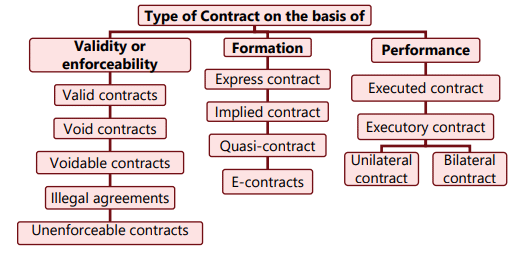
I. On the basis of the validity
- Valid Contract: An agreement which is binding and enforceable is a valid contract. It contains all the essential elements of a valid contract.
Example 17: A asks B if he wants to buy his bike for ₹ 50,000. B agrees to buy a bike. It is an agreement which is enforceable by law. Hence, it is a valid contract. - Void Contract:Section 2 (j) states as follows: “A contract which ceases to be enforceable by law becomes void when it ceases to be enforceable”. Thus, a void contract cannot be enforced by a court of law.
Example 18: Mr. X agrees to write a book with a publisher. Such a contract is valid. But after a few days, X dies in an accident. Here the contract becomes void due to the impossibility of performance of the contract. Thus, a valid contract that cannot be performed because of some uncalled happening becomes void.
Example 19:A contracts with B (owner of the factory) for the supply of 10 tons of sugar, but before the supply is effected, the fire caught in the factory and everything was destroyed. Here the contract becomes void. It may be added by way of clarification here that when a contract is void, it is not a contract at all but for the purpose of identifying it, it has to be called a [void] contract. - Voidable Contract: Section 2(i) defines that “an agreement which is enforceable by law at the option of one or more parties thereto, but not at the option of the other or others is a voidable contract”. This in fact means where one of the parties to the agreement is in a position or is legally entitled or authorized to avoid performing his part, then the agreement is treated and becomes voidable.
Following are the situations where a contract is voidable:
(i)When the consent of the party is not free is caused by coercion, undue influence, misrepresentation or fraud.
Example 20: X promises to sell his scooter to Y for ₹ 1 Lac. However, the consent of X has been procured by Y at a gunpoint. X is an aggrieved party, and the contract is voidable at his option but not on the option of Y. It means if X accepts the contract, the contract becomes a valid contract then Y has no option of rescinding the contract.
(ii) When a person promises to do something for another person, but the other person prevents him from performing his promise, the contract becomes voidable at the option of first person.
Example 21: There is a contract between A and B to sell car of A to B for ₹ 2,00,000. On due date of performance, A asks B that he does not want to sell his car. Here, contract is voidable at the option of B.
(iii) When a party to a contract promises to perform a work within a specified time, could not perform with in that time, the contract is voidable at the option of the promisee.
Example 22:A agrees to construct a house for B upto 31-3-2022 but A could not complete the house on that date. Here contract is voidable at the option of B. At this juncture, it would be desirable to know the distinction between a Void Contract and a Voidable Contract. These are elaborated hereunder: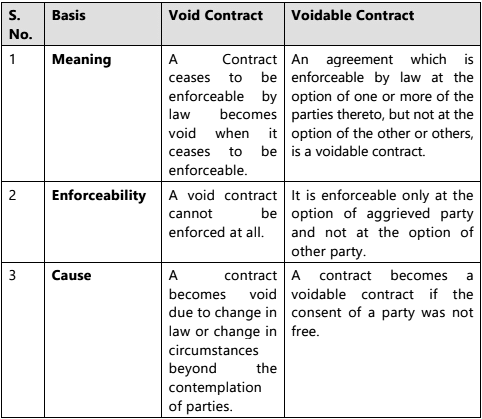
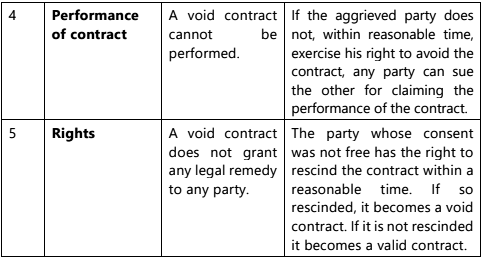
- Illegal Contract:It is a contract that is prohibited by law. The court will not enforce this contract or any related contracts. All illegal agreements are void, but not all void agreements are inherently illegal. However, both types share the similarity of being void ab initio and unenforceable by law.
Example 23: A contract that is immoral or opposed to public policy are illegal in nature. Similarly, if R agrees with S, to purchase brown sugar, it is an illegal agreement.
According to Section 2(g) of the Indian Contract Act, “an agreement not enforceable by law is void”. The Act has specified various factors due to which an agreement may be considered as void agreement. One of these factors is the unlawfulness of object and consideration of the contract i.e. illegality of the contract which makes it void. The illegal and void agreements differ from each other in the following respects: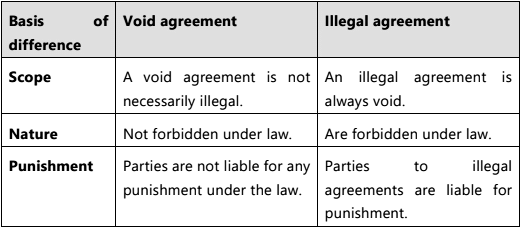

- Unenforceable Contract:Where a contract is good in substance but because of some technical defect i.e. absence in writing, barred by limitation etc. one or both the parties cannot sue upon it, it is described as an unenforceable contract.
Example 24: A bought goods from B in 2018. But no payment was made till 2022. B cannot sue A for the payment in 2022 as it has crossed three years and barred by Limitation Act. A good debt becomes unenforceable after the period of three years as barred by Limitation Act.
Similarly, an agreement for transfer of immovable property should be written for being enforceable.
II. On the basis of the formation of contract
Express Contracts: An express contract is formed when the terms are communicated through words or writing. According to Section 9 of the Act, if a proposal or acceptance is made in words, it is classified as an express promise.
Example 25: If A tells B over the phone that he offers to sell his house for ₹20 lacs and B replies that he accepts the offer, this constitutes an express contract.
Implied Contracts: Implied contracts arise from the actions or conduct of the parties or their ongoing interactions. Section 9 of the Act recognizes implied contracts when proposals or acceptances occur outside of verbal communication.
Example 26: If a coolie in uniform picks up A's luggage at the railway station without being asked, and A allows this, an implied contract exists, requiring A to pay for the coolie's services.
Example 27: When A drinks coffee at a restaurant, there is an implied contract that he will pay for the coffee.
Tacit Contracts: Tacit contracts are inferred from the parties' conduct without any spoken or written communication. A typical example is when a customer withdraws cash from an ATM, indicating a tacit agreement. Another example is the assumption of a contract at an auction when the hammer falls.
Quasi-Contract: A quasi-contract is not a true contract but is similar in nature. It is legally imposed under certain conditions, creating obligations without a formal agreement. Essentially, it exists when there is no intention from either party to form a contract, yet the law enforces one.
Example 28: The obligation of a finder of lost goods to return them to the rightful owner, or the responsibility of someone who received money by mistake to repay it, illustrates quasi-contracts due to the absence of offer, acceptance, or consent.
Example 29: If T, a tradesman, mistakenly leaves goods at C's house and C treats them as his own, C is obligated to pay for the goods.
E-Contracts: E-contracts are formed when parties enter into an agreement using electronic means, such as emails. In electronic commerce, various parties create networks interlinked through Electronic Data Interchange (EDI), facilitating business transactions electronically. These are referred to as EDI contracts, Cyber contracts, or mouse click contracts.
III. On the basis of the performance of the contract
- Executed Contract: The consideration in a given contract can be an act or forbearance. When the act is performed or the forbearance is documented, the contract is classified as an executed contract.
Example 30: When a grocer sells sugar for cash payment, it constitutes an executed contract because both parties have fulfilled their obligations under the contract. - Executory Contract: In an executory contract, the consideration consists of reciprocal promises or obligations. Such consideration is to be fulfilled in the future, leading to the designation of these contracts as executory contracts.
Example 31: If G agrees to tutor H, a pre-engineering student, starting next month, and H promises to pay G ₹1,000 per month, the contract is executory because it has yet to be performed. - Unilateral or Bilateral Contracts:These are types of executory contracts and are not distinct categories.
- (a) Unilateral Contract: A unilateral contract is one where one party has fulfilled their obligation while the other party's obligation remains unfulfilled.
Example 32: M offers a reward of ₹50,000 to anyone who finds his missing boy. Once B finds the boy, an executed contract arises because B has fulfilled their part, and it is now M's obligation to pay the reward.
- (b) Bilateral Contract: A bilateral contract is characterized by outstanding obligations or promises from both parties.
Example 33: A promises to sell his plot to B for ₹10 lacs in cash. B pays ₹2,50,000 as earnest money and promises to pay the remainder the following Sunday. A provides possession of the plot and promises to execute a sale deed upon full payment. The contract remains executory because there are obligations pending on both side
Proposal / Offer [Section 2(a) of the Indian Contract Act, 1872]
Definition of Offer/Proposal:
According to Section 2(a) of the Indian Contract Act, 1872, “when one person signifies to another his willingness to do or to abstain from doing anything with a view to obtaining the assent of that other to such act or abstinence, he is said to make a proposal”.
Essentials of a proposal/offer are-
- The person making the proposal or offer is called the ‘promisor’ or ‘offeror’:The person to whom the offer is made is called the ‘offeree’ and the person accepting the offer is called the ‘promisee’ or ‘acceptor’.
- For a valid offer, the party making it must express his willingness ‘to do’ or ‘not to do’ something: There must be an expression of willingness to do or not to do some act by the offeror.
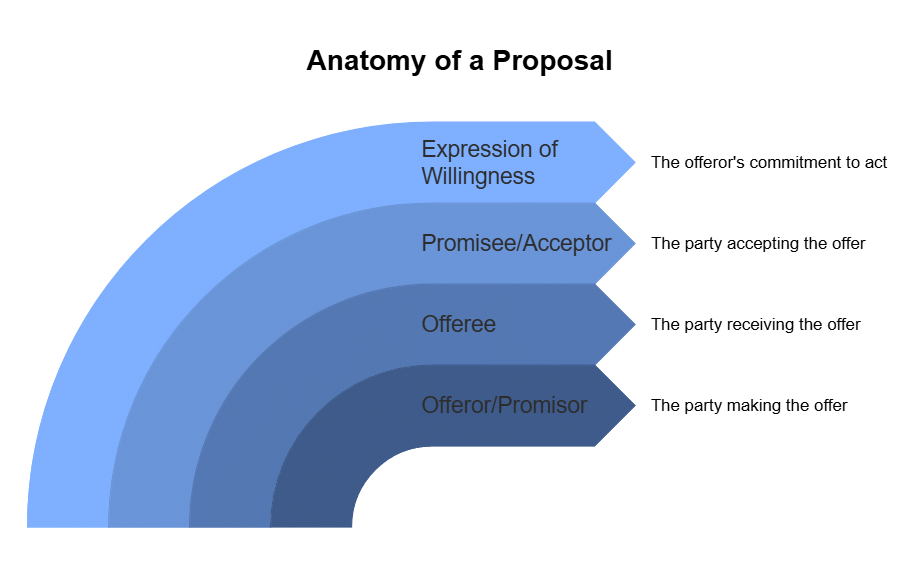 Example 34:A willing to sell his good at certain price to B.
Example 34:A willing to sell his good at certain price to B.
Example 35:A is willing to not to dance in a competition if B pays him certain sum of money. - The willingness must be expressed with a view to obtain the assent of the other party to whom the offer is made.
Example 36: Where ‘A’ tells ‘B’ that he desires to marry by the end of 2022, it does not constitute an offer of marriage by ‘A’ to ‘B’. Therefore, to constitute a valid offer expression of willingness must be made to obtain the assent (acceptance) of the other. Thus, if in the above example, ‘A’ further adds, ‘Will you marry me’, it will constitute an offer. - An offer can be positive as well as negative: Thus “doing” is a positive act and “not doing”, or “abstinence” is a negative act; nonetheless both these acts have the same effect in the eyes of law.
Example 37: A offers to sell his car to B for ₹ 3 lacs is an act of doing. So in this case, A is making an offer to B.
Example 38: When A ask B after his car meets with an accident with B’s scooter not to go to Court and he will pay the repair charges to B for the damage to B’s scooter; it is an act of not doing or abstinence.

Classification of offer
An offer can be classified as general offer, special/specific offer, cross offer, counter offer, standing/ open/ continuing offer.
Now let us examine each one of them.
Types of Offers in Contract Law
(a) General Offer
A general offer is made to the public at large, allowing anyone to accept and perform the desired act (Carlill Vs. Carbolic Smoke Ball Co.). According to Section 8 of the Act, anyone fulfilling the conditions of the offer is considered to have accepted it. The offer remains open for acceptance until it is retracted.
Case Law: Carlill Vs. Carbolic Smoke Ball Co. (1893)
Facts: The Carbolic Smoke Ball Co. advertised a £100 reward for anyone contracting influenza after using their product as directed. Mrs. Carlill used the smoke balls as instructed and contracted influenza. She was entitled to the reward as her usage constituted acceptance of the offer.
(b) Special/Specific Offer
A specific offer is directed to a particular individual or an ascertained person, and it can only be accepted by that specific person.
Example 39: ‘A’ offers to sell his car to ‘B’ at a specific price. This is a specific offer.
Case Law: Boulton Vs. Jones
(c) Cross Offer
Cross offers occur when two parties unknowingly make identical offers to each other. No binding contract exists in such cases since one offer cannot be accepted as the other’s acceptance.
Example 40: If A offers to sell his car for ₹2 lacs and B, unaware of A's offer, proposes to buy the same car for ₹2 lacs, this is a cross offer, not an acceptance. There is no binding contract.
(d) Counter Offer
A counteroffer is made when the offeree accepts the original offer with modifications. This counters the original offer, effectively rejecting it.
Example 41: ‘A’ offers to sell his plot for ₹10 lakhs. If ‘B’ proposes to buy it for ₹8 lakhs, this is a counter offer, terminating A's original offer. If later B agrees to ₹10 lakhs, A can refuse.
(e) Standing or Continuing or Open Offer
A standing or open offer remains available for acceptance over time. Tenders for goods supply often represent this kind of offer.
Essential of a valid offer
- It must be capable of creating legal relations: Offer must be such as in law is capable of being accepted and giving rise to legal relationship. If the offer does not intend to give rise to legal consequences and creating legal relations, it is not considered as a valid offer in the eye of law. A social invitation, even if it is accepted, does not create legal relations because it is not so intended.
Example 42: A invited B on his birthday party. B accepted the proposal but when B reached the venue, he (B) found that A was not there. He filed the suit against A for recovery of travelling expenses incurred by him to join the birthday party. Held, such an invitation did not create a legal relationship. It is a social activity. Hence, B could not succeed. - It must be certain, definite and not vague: If the terms of an offer are vague or indefinite, its acceptance cannot create any contractual relationship.
Example 43:A offers to sell B 100 quintals of oil, there is nothing whatever to show what kind of oil was intended. The offer is not capable of being accepted for want of certainty. If in the above example, A is a dealer in mustard oil only, it shall constitute a valid offer. - It must be communicated to the offeree: An offer, to be complete, must be communicated to the person to whom it is made, otherwise there can be no acceptance of it. Unless an offer is communicated, there can be no acceptance by it. An acceptance of an offer, in ignorance of the offer, is not acceptance and does not confer any right on the acceptor.
This can be illustrated by the landmark case ofLalman Shukla v. GauriDutt
Facts: G (Gauridutt) sent his servant L (Lalman) to trace his missing nephew. He then announced that anybody who traced his nephew would be entitled to a certain reward. L traced the boy in ignorance of this announcement. Subsequently when he came to know of the reward, he claimed it. Held, he was not entitled to the reward, as he did not know the offer. - It must be made with a view to obtaining the assent of the other party: Offer must be made with a view to obtaining the assent of the other party addressed and not merely with a view to disclosing the intention of making an offer.
- It may be conditional: An offer can be made subject to any terms and conditions by the offeror.
Example 44: Offeror may ask for payment by RTGS, NEFT etc. The offeree will have to accept all the terms of the offer otherwise the contract will be treated as invalid. - Offer should not contain a term the non-compliance of which would amount to acceptance: Thus, one cannot say that if acceptance is not communicated by a certain time the offer would be considered as accepted.
Example 45: A proposes B to purchase his android mobile for ₹5000 and if no reply by him in a week, it would be assumed that B had accepted the proposal. This would not result into contract. - The offer may be either specific or general:Any offer can be made to either public at large or to the any specific person. (Already explained in the heading-types of the offer) 8
- The offer may be express or implied: An offer may be made either by words or by conduct. Example 46: A boy starts cleaning the car as it stops on the traffic signal without being asked to do so, in such circumstances any reasonable man could guess that he expects to be paid for this, here boy makes an implied offer.
- Offer is Different from a mere statement of intention, an invitation to offer, a mere communication of information, A prospectus and Advertisement.
(i) A statement of intention and announcement.
Example 47: A father wrote his son about his wish of making him the owner of all his property is mere a statement of intention.
Example 48:An announcement to give scholarships to children scoring more than 95% in 12th board is not an offer.
(ii) Offer must be distinguished from an answer to a question.
Case Law: Harvey vs. Facie [1893] AC 552 The Privy Council succinctly clarified the difference between an offer and an invitation to offer. In the case in question, the plaintiffs sent a telegram to the defendants asking two questions:
- Will you sell us Bumper Hall Pen?
- Telegraph lowest cash price.
The defendants responded via telegram stating, “the lowest price for Bumper Hall Pen is £900.” The plaintiffs then sent another telegram replying, “we agree to buy Bumper Hall Pen at £900.” However, the defendants refused to sell the property at that price. The plaintiffs sued the defendants, arguing that they had made an offer to sell the property at £900, and thus they were bound by that offer. However, the Privy Council disagreed with the plaintiffs, noting that while the plaintiffs asked two questions, the defendants only answered the second question by providing a price, while not indicating their willingness to sell. Therefore, no offer was made. Their Lordships concluded that merely stating the lowest price at which a vendor would sell does not imply a contract to sell to the party who inquired about the price. This decision was echoed in the case of Mac Pherson vs. Appanna [1951] A.S.C. 184, where the property owner stated they would not accept less than £6000 for it. This statement was deemed not an offer but merely an invitation to offer. (iii) A statement of price is not an offer: Quoting a price for a product does not constitute an offer (refer to the case of Harvey Vs. Facie discussed above).
Example 49:A price list for goods does not constitute an offer for sale at the listed prices; it is an invitation to offer.
(iv) An invitation to make an offer or do business: In the case of “an invitation to make an offer,” the party making the invitation is not making an offer but inviting the other party to make an offer. The goal is to signal readiness to engage with anyone willing to enter into a contract based on the invitation, subject to final terms and conditions.
Example 50: An advertisement for the sale of goods by auction is an invitation to offer. It merely invites offers/bids made during the auction. When goods are sold at auction, the auctioneer does not contract with anyone attending the sale. The auction acts only as an advertisement to sell, even though attendees may intend to purchase. A similar ruling was made in Harris vs. Nickerson (1873). Likewise, a prospectus issued by a company is merely an invitation to the public to make an offer to subscribe to the company's securities.
10. A statement of price is not an offer.
What is invitation to offer?
An offer should be distinguished from an invitation to offer. An offer is definite and capable of converting an intention into a contract. Whereas an invitation to an offer is only a circulation of an offer, it is an attempt to induce offers and precedes a definite offer. An invitation to offer is an act precedent to making an offer. Acceptance of an invitation to an offer does not result in the contract and only an offer emerges in the process of negotiation.
When a person advertises that he has stock of books to sell or houses to let, there is no offer to be bound by any contract. Such advertisements are offers to negotiateoffers to receive offers. In order to ascertain whether a particular statement amounts to an ‘offer’ or an ‘invitation to offer’, the test would be intention with which such statement is made. Does the person who made the statement intend to be bound by it as soon as it is accepted by the other or he intends to do some further act, before he becomes bound by it. In the former case, it amounts to an offer and in the latter case, it is an invitation to offer.
Difference between offer and invitation to make an offer:
In terms of Section 2(a) of the Act, an offer is the final expression of willingness by the offeror to be bound by the offer should the other party chooses to accept it. On the other hand, offers made with the intention to negotiate or offers to receive offers are known as invitation to offer. Thus, where a party without expressing his final willingness proposes certain terms on which he is willing to negotiate he does not make an offer, but only invites the other party to make an offer on those terms. Hence the only thing that is required is the willingness of the offeree to abide by the terms of offer.
In order to ascertain whether a particular statement amounts to an offer or an invitation to offer, the test would be intention with which such statement is made. The mere statement of the lowest price which the vendor would sell contains no implied contract to sell at that price to the person making the inquiry.
If a person who makes the statement has the intention to be bound by it as soon as the other accepts, he is making an offer. Thus, the intention to be bound is important factor to be considered in deciding whether a statement is an ‘offer’ or ‘invitation to offer.’
Following are instances of invitation to offer to buy or sell:
(i) A Prospectus by a company to the public to subscribe for its shares.
(ii) Display of goods for sale in shop windows.
(iii) Advertising auction sales and
(iv)Quotation of prices sent in reply to a query regarding price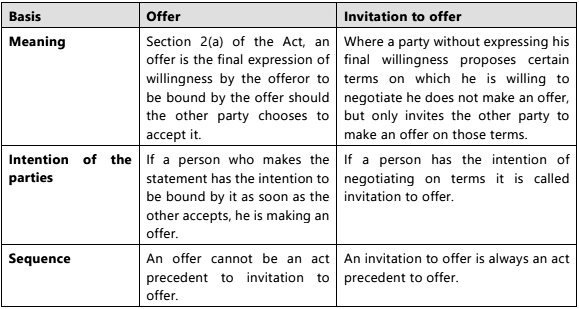

|
32 videos|185 docs|57 tests
|
FAQs on Unit 1: Nature of Contracts - 1 Chapter Notes - Business Laws for CA Foundation
| 1. What is a contract and why is it important in law? |  |
| 2. What are the essentials of a valid contract? |  |
| 3. What are the different types of contracts recognized under the Indian Contract Act, 1872? |  |
| 4. What is a proposal or offer as per Section 2(a) of the Indian Contract Act, 1872? |  |
| 5. How can a proposal be revoked, and what are the conditions for revocation? |  |





















